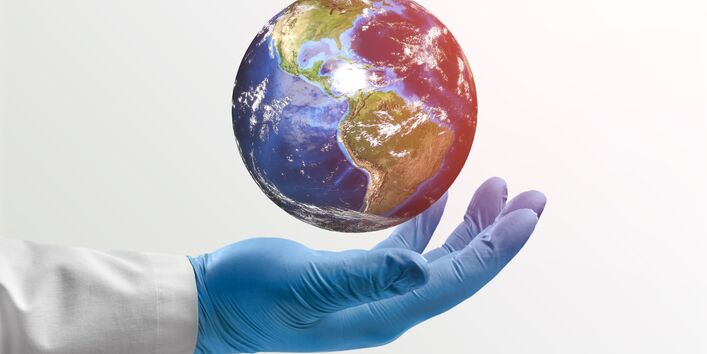An effective strategy for reducing pharmaceutical residues in water bodies must primarily include the responsible use of medicines. A sole focus on wastewater treatment and drinking water purification is not sufficient, even though advancing sewage treatment technology by introducing a quaternary treatment to remove anthropogenic trace substances is an important component.
Concepts and mitigation strategies
To ensure the long-term protection of ecosystems such as water bodies and soils, and for preventive health protection, the entry of pharmaceuticals into the environment must be sustainably reduced throughout the entire lifecycle of medicinal products.
Table of contents
Development and production
In line with the precautionary principle and to protect human health and the environment, solutions should primarily target the beginning of the causal chain. Environmental aspects should ideally be considered as early as the drug development stage, for example, by designing active substances that are more degradable in sewage treatment plants and in the environment. Under the concept of "Green Pharmacy," various approaches are being pursued to integrate environmental considerations—such as improved degradability in sewage treatment plants and the environment—into the drug development process (1). Additionally, new application methods could be explored to enable more efficient and targeted dosing of active substances.
Closing data gaps
In recent years, several EU-funded research programmes have investigated the environmental impacts of pharmaceuticals, confirming their relevance as an environmental issue. Despite the increasing research activity, the environmental risks of a large number of active substances still cannot be fully assessed, particularly for those introduced before environmental testing was legally required. For many of these so-called legacy pharmaceuticals, there is limited environmental data, especially regarding their environmental fate and long-term effects on environmental organisms. Such data are currently collected only during the authorisation process for new medicines and not retrospectively for products already on the market. To address this issue, the UBA has been advocating for the introduction of "active substance monographs" for years. These monographs would compile all relevant and officially verified data necessary for environmental risk assessment according to legal requirements. These collections of verified environmental data could be used in all future authorisation procedures, and data gaps for legacy pharmaceuticals could also be systematically closed within this framework.
Regulations for the protection of surface water
Water resources require special protection not only as habitats for aquatic organisms but also as an essential resource for human life. The legal basis for water protection is established by the European Water Framework Directive (2000/60/EC) (EU-WFD) and its Daughter Directive (2013/39/EU) on priority substances in water policy. These regulations are implemented in Germany through the Ordinance on the Protection of Surface Waters (OGewV). The OGewV governs the classification and monitoring of the ecological and chemical status of water bodies. For the assessment of chemical parameters, Environmental Quality Standards (EQS) have been established for 45 EU-wide regulated priority substances under the Directive 2008/105/EC on Environmental Quality Standards in Water Policy. These standards are used to evaluate the chemical status of surface waters. In Germany, nationally regulated Environmental Quality Standards have been issued for 67 relevant pollutants, known as river basin-specific pollutants, which are also considered in the assessment of ecological status. If these standards are exceeded, specific measures must be taken to reduce the input of the respective substances. Pharmaceuticals are not yet included on these lists. However, this is expected to change with the next revision of the Directive 2008/105/EC on Environmental Quality Standards and the OGewV. The UBA, in cooperation with the federal states, is working on the establishment of Environmental Quality Standards for certain pharmaceutical substances that are considered particularly problematic.
Further information:
Prescription and Dispensing
An important contribution to reducing pharmaceutical residues will come from a responsible approach to the use of medicines, starting with adapted prescribing practices in medical practices, promoting a healthier lifestyle, and ensuring the proper disposal of pharmaceutical residues by patients.
Further information:
Enhancing Communication and Awareness
To promote the responsible use of drugs in society, an expanded and continuous information campaign on the topic of pharmaceuticals in the environment is essential. The UBA aims to raise awareness about the sustainable use of medicines at various levels, such as in the training of medical personnel and in the university education of future doctors and pharmacists. Following this approach, educational materials for university teaching and continuing education were developed as part of a project in 2024. Additionally, information materials on the proper disposal of leftover medicines were created, which can be distributed through pharmacies.
Further information: Teaching materials on pharmaceuticals and the environment
To reach a broader audience, larger-scale awareness campaigns for the protection of human health and the environment should also be promoted. In line with this goal, the Federal Ministry for the Environment, Nature Conservation, and Nuclear Safety (BMU) launched the "Gib der Natur nicht den Rest" ("Don’t flush it – protect nature!“) campaign in spring 2020. The campaign aimed to inform and raise public awareness about the proper disposal of unused medicines.
Further Information on the Campaign: www.richtigentsorgenwirkt.de
